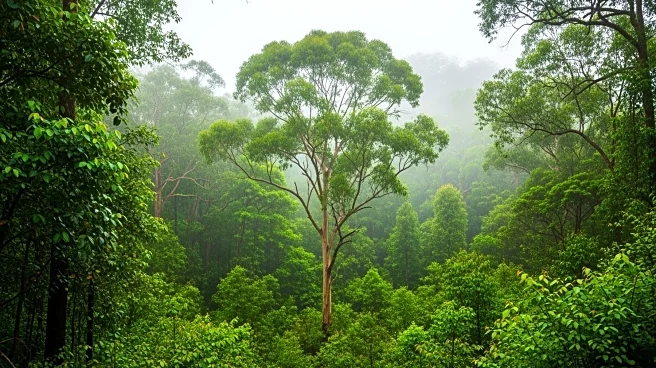What's Happening?
A recent study published in the journal Nature reveals that Australia's tropical rainforests are releasing more carbon than they absorb, marking a significant shift in their role as carbon sinks. The research,
based on 49 years of data from 20 forests in Queensland, attributes this change to extreme temperatures and increased cyclone activity, which have led to higher tree mortality rates. Dr. Hannah Carle from Western Sydney University highlights that the findings challenge current models that overestimate the capacity of tropical forests to offset fossil fuel emissions. The study suggests that the trunks and branches of dead trees have become carbon emitters, rather than absorbers, over the past 25 years.
Why It's Important?
The implications of this study are profound for global emissions reduction targets, which rely on ecosystems like rainforests to absorb carbon. Australia's rainforests, traditionally seen as carbon sinks, are now contributing to carbon emissions, potentially undermining efforts to curb climate change. This development could serve as a warning for other tropical forests worldwide, indicating a broader trend that may affect global climate policies. As Australia faces criticism for its reliance on fossil fuels, the study underscores the urgent need for effective climate action and adaptation strategies.
What's Next?
Australia has announced new carbon reduction targets, aiming to cut emissions by at least 62% compared to 2005 levels over the next decade. However, the continued operation of major fossil fuel projects, like Woodside's North West Shelf, poses challenges to achieving these goals. The study calls for more research to assess the impact on other tropical forests and to refine climate models. Policymakers may need to reconsider strategies for forest conservation and carbon management to address the changing dynamics of carbon absorption.
Beyond the Headlines
The study raises ethical and environmental concerns about the sustainability of current practices and the long-term health of tropical ecosystems. As rainforests transition from carbon sinks to sources, there may be increased pressure on governments and industries to innovate and invest in sustainable solutions. The findings could influence international climate negotiations and drive global efforts to protect and restore forest ecosystems.









